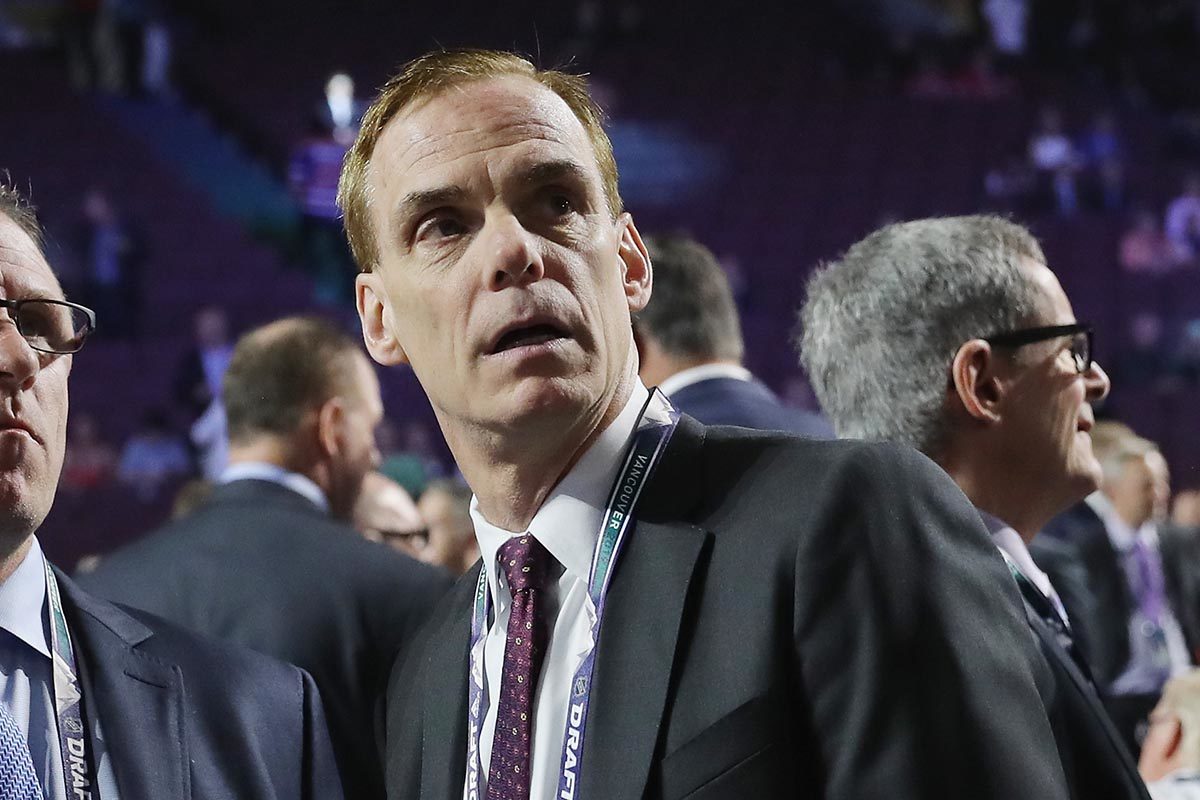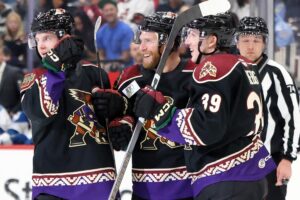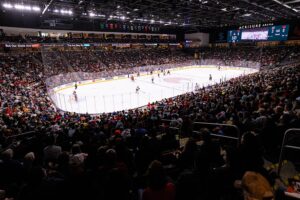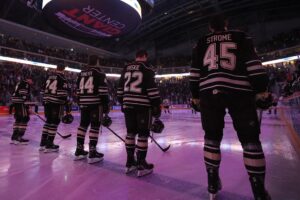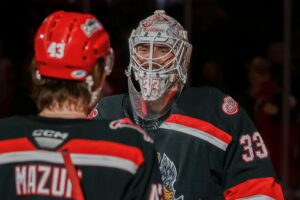📝 by Patrick Williams
Dave Andrews made it a tradition to hold court each winter in his role as President of the American Hockey League, delivering his state-of-the-league address and taking a long list of questions from reporters at the AHL All-Star Classic.
Those sessions became one of the most anticipated events at each year’s event and helped to frame what would be next for the AHL through its dramatic 26-year evolution.
Now it’s Scott Howson’s turn. When Andrews transitioned to the role of Chairman of the AHL Board of Governors before the 2020-21 season, Howson took over for him as the AHL’s 10th President and Chief Executive Officer.
With 26 seasons as a National Hockey League executive with the Columbus Blue Jackets and Edmonton Oilers, Howson arrived at the league office with an extensive resume, with GM roles at both the NHL and AHL levels. He played five seasons of pro hockey, including 18 games in the NHL, and earned a degree from York University’s Osgoode Hall Law School in Toronto.
Players, executives, and personnel from across the league had expected to be at the 2022 AHL All-Star Classic in Laval today, but while the COVID-19 pandemic forced the postponement of those plans, Howson was still willing to dish on where the AHL has been in the past year and what is next for the NHL’s top development league.
Here is what Howson had to say on an extensive range of league and team issues:
ON THIS SEASON’S CHALLENGES
“Well, it’s really gone in fits and starts. I can’t say that the first couple of months were all that challenging. We had some hiccups, but not that many.
“And then [U.S.] Thanksgiving came, and really Thanksgiving through the middle of January was very challenging for everybody. We got hit with hundreds of cases of the virus, and it seemed like every morning we’d come in the office, and we’d just talk to the teams and see who was struggling… We had to postpone a lot of games. Since about the middle of January it has settled down, and we seem to be on a good path right now.
“You can never take anything for granted with this virus. We know that. But right now we’re on a good path. We had 77 games postponed due to COVID issues, and we’re down to just three now that we’ve still got to get rescheduled. So that’s a positive.”
ON TAXI SQUADS
“We’re a development league for the NHL. That’s a big part of our mission statement, to make sure we’re providing what the NHL needs, and that was a necessary piece of business for them to try and get through a tough stretch.
“We have good communication with the NHL. We knew it was coming. Our teams knew it was coming, and we all fought through it. I’m glad we were able to help in that way in terms of having players for the taxi squads, and now it looks like it’s not needed right now.
“We’ll just move forward, and I think the quality of our play will go significantly up without taxi squads.”
ON BALANCING TEAMS’ NEEDS AND WISHES WITH THE REALITIES THAT THE PANDEMIC HAS IMPOSED
“Our teams are really realistic and quite cooperative and understanding about what we had to do to get through this. We had a lot of help from the NHL to get through, particularly last year, and I was very proud of our league last year to get through even a partial season and get our players on the ice and make sure we didn’t lose a whole year of development.
“Our teams are very realistic. We all cooperate with each other, and we got through it. And we got through a very difficult stretch [this season]. Teams work together. There wasn’t a lot of push-back when we had to postpone games. It was just a reality.”
ON AVOIDING THE CALDER CUP PLAYOFFS FROM STRETCHING TOO DEEPLY INTO THE SUMMER
“I really wanted to keep [the end of the playoffs] at June 30, and that was why we extended the regular season for only six days [to April 30]. Obviously if we’ve learned anything, we have to be flexible. We’ve been forced to be flexible and adapt over the last 20 months. So, we’ll be flexible.
“But really, ideally, the summers are too important for our players and for our staffs. You just can’t leak too much into the summer, and June 30 was the date that we had set as a league. We’re not interested in going beyond that. So hopefully that’s going to work out, and there’s going to be no more hiccups along the way here.”
ON THE CHALLENGES OF RESCHEDULING SO MANY GAMES THIS SEASON
“Melissa [Caruso, the AHL’s vice president of hockey operations and governance] has done a great job.
“I give credit to our teams. A lot of our teams have just worked it out themselves, with Melissa’s help to make sure that it makes sense from a league point of view. So, a lot got done that way with our teams cooperating. There’s been a half-dozen or so that were contentious that the league [had] to step in and make a decision. Melissa…knows the ins and outs and can certainly help the teams arrive at a fair conclusion.”
ON THE PANDEMIC’S FINANCIAL IMPACT
“Everybody adjusted their budgets last year, so the league’s budget got adjusted and the teams’ did, too. Last year there was very, very little revenue coming in, so that was tough. Three teams didn’t operate at all for a year.
“This year, I think everybody was certainly cognizant of the fact that we might not come back at full strength. But we’re back at 31 teams; I don’t think we’re any different than most sports leagues in that we’re down, but we’re surviving, and things are gradually starting to trend back up. I can see even in the last couple of weeks stronger attendance numbers. Hopefully we’re going to have a really good second half and a good [Calder Cup Playoffs].”
ON HIRING 10 FEMALE ON-ICE OFFICIALS THIS SEASON
“It’s been really positive. It’s been received really positively by our teams. I think those women were obviously deserving of the opportunity. I’m really pleased with their development, I’m really pleased where they are in our league, and I’m really pleased that we were able to take that initiative and move it forward because it was time.
“I’m a really big believer that when people see it, they believe it, so they’re really beacons of light for young women that anything’s possible.”
ON BRINGING THE OFFICIATING INITIATIVE TO REALITY
“It was really discussions over the summer with Hayley Moore [the AHL’s vice president of hockey operations] and the NHL. The NHL wanted to move forward in this way. We did, too. Hayley and I talked about it last season, and we just felt that we didn’t want to rush into it right then.
“But we talked about it, that the NHL was ready to move forward with it. They had [officiating] combines. We had them in our development camps. So that’s how it came about. It was really a partnership between us and between [NHL director of officiating] Stephen Walkom’s group for the NHL.”
ON BRINGING A UNIFIED 72-GAME REGULAR SEASON TO FRUITION FOR 2022-23
“I think it was just time. It’s really the teams that decided, and a lot of teams made a sacrifice and a compromise. I think everybody saw that [having varying schedule lengths] was not a great look for the league. But it was certainly survivable, and it was necessary in 2015 to get the Pacific Division done and competing in our league.
I think everybody just took another look at it and said it’s time. We worked very hard at it. Our teams worked very hard at it. A lot of people had a lot of input into it. Everybody just said it’s time. If I’m a team that wants 76 games, I’m willing to go to 72 for the good of the league. And if I’m a team at 68, I’m willing to go to 72. But it took a lot of cooperation, a lot of hard work.
“When I interviewed for the job, I said to the search committee, ‘You know, I really believe this is going to happen. I just can’t tell you when it’s going to happen. There’s going to come a time where it’s the right thing.’
“I wasn’t really envisioning it would happen so soon, but I’m certainly glad it did.”
ON INTEGRATING COACHELLA VALLEY INTO THE LEAGUE NEXT SEASON
“I think we’re all excited about what that’s going to bring. We’ve seen what Henderson has done, and I think Coachella Valley is going to be another strong market for our league.
“The challenge will be when can they play their first home game? That’s still to be determined. Certainly we expect it to be in the fall some time, but are they going to have to spend a couple of weeks on the road? Six weeks on the road?
“We don’t know the answers to that. We’ll work through [those decisions].”
ON POTENTIAL DIVISIONAL REALIGNMENT NEXT SEASON WITH THE ADDITION OF COACHELLA VALLEY
“We’ll go with a 10-team Pacific Division, provided that they have the number of playoff qualifiers that suits them. Right now, that’ll be seven.
“The [current Pacific Division teams are] pretty entrenched. They all want to stay there together, so I don’t see in the immediate future any divisional realignment. I think we’ll be very similar to what we are right now with the addition of Coachella Valley to the Pacific.”
ON STAYING IN ALL OF THE LEAGUE’S CURRENT MARKETS IN 2022-23
“I expect adding Coachella Valley, we’re going to have 32 teams, and they’re all going to be in the same location. That’s my expectation as we speak today.”
ON RETURNING TO ABBOTSFORD
“It’s been very strong. They’re one of our higher revenue-producing teams. They got hurt a little bit because of the COVID restrictions [in Canada], but I have no doubt that Abbotsford’s going to be really, really successful right in the heart of Vancouver Canucks territory, and they’re off to a really strong start this year in tough circumstances.”
ON A NEW ARENA FOR THE SAN JOSE BARRACUDA AT SHARKS ICE AT SAN JOSE
“I think that’s going to re-energize that market and that franchise.
“They’ve been in the SAP Center, and that hasn’t worked for them other than it’s been ideal for the Sharks’ whole hockey operations to work together and to have players there, and I think they’ve been really pleased that way.
“But it’s been a tougher draw. I think having a new building that’s the right size, I think it’s going to re-energize the whole franchise and generate a lot of interest for our league and for them.”
ON EXPANDING THE LEAGUE’S NATIONAL TELEVISION FOOTPRINT IN THE UNITED STATES
“Well, we would love to. We haven’t been able to crack that nut so far. But we continue to work on it. We are on the NHL Network sporadically. It’s just a tough nut for us to crack right now.
“You don’t know what’s going to come up here in the future, and we’re poised to certainly have those discussions. But again, nothing imminent.”
ON THE IMPORTANCE OF LOCAL TELEVISION DEALS
“I think it is crucial to get that exposure, to get in front of people in their living rooms.
“I give our teams a lot of credit for continuing to do that, and the interest was there in the local markets. I think it’s a great marketing tool, and I’m hopeful that that’s just going to continue to grow and grow for our teams.”
ON THE AHL’S PARTNERSHIP WITH GENIUS SPORTS
“The partnership’s gone great. So far, it’s been a win-win certainly for the league and from what we’re hearing, a win for Genius Sports.
“We’ll continue to work with Genius and see if there’s ways to grow it. And then our teams, they’re all free to deal with other [betting] partners, and they are doing that.
“If you looked at it five, 10 years ago, nobody would have thought that this would have been a big revenue source for the leagues and the teams, but it’s become a very significant revenue source, so we’re going to keep trying to work on it and tap it.
ON MAKING TIME-ON-ICE PUBLICLY AVAILABLE AS AN OFFICIAL LEAGUE STATISTIC
“It’s something the fans have a lot of interest in. It’s something the league does, too.
“It’s something that we’re exploring. The problem with what we were doing with time-on-ice is that it just wasn’t accurate enough. We’re trying to find a way to make sure that before we bring it to our Board to say we want to go public with it, we want it to be accurate. So, we’re still in the process of digging into that.
“It is a long-term goal of mine to make time-on-ice an accurate public stat, and we’ll just have to keep working.”
ON THE AHL’S ROLE IN DIVERSITY AND INCLUSION INITIATIVES
“[It is] a high priority for me to make sure we’re doing everything we can in inclusion and diversity and that we’re doing our part to make sure that this game is truly for everyone. ‘Hockey is for Everyone’ is an ideal and a goal.
“We’re going to be part of the NHL’s Respect initiative with [former player and co-founder of the Respect Group] Sheldon Kennedy and [NHL Senior Executive Vice President of Social Impact, Growth Initiatives and Legislative Affairs] Kim Davis. I’ll be participating in a meeting this week, as a matter of fact, on that.
“We’re going to make sure our teams are doing our part.”
ON THE ROLE THAT THE AHL CAN PLAY IN THOSE GOALS
“The first thing is awareness and making sure that we’re living the ideal ourselves.
“And then it’s just trying to make our game available across all groups, because our game hasn’t really been exposed in certain parts of the country. The barriers to entry can be hard. It’s an expensive game. There’s all kinds of ways to get sticks and balls or pucks in people’s hands, and once you do that, I really think that people grow to love our sport. So that’s what we can do.
“But the first thing we have to do is make sure we’re living it internally, that we are inclusive. You have to have an inclusive attitude if you’re going to be diverse, and that’s where it starts.”
ON THE FUTURE
“I had all these lofty goals, long-term goals, coming in, and then the pandemic has really taken a lot of our time. That’s okay. That’s what we’re here for, to manage through this.
“We want to keep growing. We want to get back to the levels we were in [2019-20]. We’re not there yet, but I think we can get back there fairly quickly.”
“I inherited a terrific staff at the AHL office. I really enjoy working with them. They’re young, they’re bright, they’re energetic. I haven’t gotten around to every market yet. I want to do that. The pandemic’s been a large factor in that. Just working with our teams and getting to know everybody and making sure that we’re doing the right thing for the league, because I really believe in this league.
“I love this league, and I want to make sure that our office at the AHL is doing everything we can to put our teams in positions to succeed.”
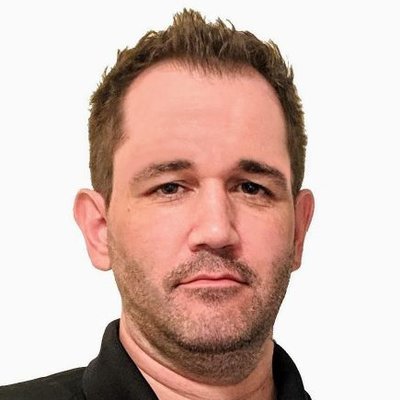
TheAHL.com features writer Patrick Williams has been on the American Hockey League beat for nearly two decades for outlets including NHL.com, Sportsnet, TSN, The Hockey News, SiriusXM NHL Network Radio and SLAM! Sports, and was most recently the co-host of The Hockey News On The ‘A’ podcast. He was the recipient of the AHL’s James H. Ellery Memorial Award for his outstanding coverage of the league in 2016.

































